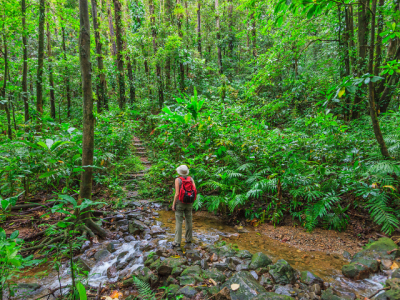
In a case of widespread municipal importance (Echeverria et al v. Town of Tunbridge), two Tunbridge landowners are appealing an Orange County Superior Court ruling that the town holds the legal authority to determine whether and how to build, maintain, and repair the legal municipal trail located on their property. Legal trails are defined as a “public right of way that is not a highway and that (A) previously was a designated town highway having the same width as the designated town highway, or a lesser width if so designated; or (B) a new public right-of-way laid out as a trail by the selectmen for the purpose of providing access to abutting properties or for recreational use.” 19 V.S.A. § 301(8). Up until this point, it has been the uncontested conventional legal wisdom that selectboards have the exclusive authority to maintain the municipality’s legal trails. The Superior Court (Court) affirmed that conventional legal wisdom.
The plaintiff landowners claim the legislature removed a municipality’s authority to maintain its legal trails with its 1986 amendments to the road classification statutes, and therefore, only the landowners can determine maintenance of legal trails that pass through their property. The Court disregarded this argument, explaining that as far back as at least 1921 it was clear that towns had authority to build and maintain their public trails. And even though some road “nomenclature change[d]” with the 1986 (and previous) amendments, there was never a suggestion in the legislative history that this authority was stripped from towns. Hence, today, it’s clear that trails “remain[] a form of public easement that the public ha[s] the right to use and that towns ha[ve] the right to build and maintain.” Furthermore, the Court noted that it “would defeat the purpose of a public easement to locate the ‘right to control’ the easement not with the town but rather with the underlying landowner, and thus require the public to bargain with that landowner for the use of the easement.” Finally, citing data from our 2024 member legal trails survey, the Court noted the frequency with which towns are maintaining their legal trails for public use. Using that data, it explained that its decision is consistent with “more than a century of both legal precedent and practical experience.”
Despite the Court’s thorough rebuke of their argument, and the legislative amendment from last session that makes it clear that towns have the authority to maintain their legal trails (See pg. 53 of Act 66 of 2025), the plaintiffs are appealing the decision to the Vermont Supreme Court. Because Act 66 is not effective until April 1, 2026, a favorable decision for the landowner before the Supreme Court would only affect trail maintenance performed before that time.
At this point, Tunbridge and their municipal attorney are vigorously defending their authority to maintain their legal trails at the Vermont Supreme Court. The Tunbridge selectboard has requested that VLCT file an amicus curiae brief (amicus) in support of the town, and the VLCT board has approved this. The MAC attorneys are currently preparing the amicus to file in support of the Town of Tunbridge's position.
Kail Romanoff, Staff Attorney II, VLCT Municipal Assistance Center